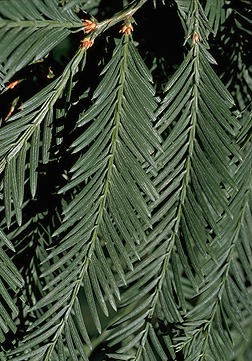


Redwood is generally believed to be the tallest tree species in the world. It grows in a high humidity climate, along the coast of northern California, and this partly accounts for its size and longevity. Redwood has high timber value. Redwood forests are also appreciated for their recreational value.
Light ![]()
Redwood's excellent shade tolerance and fast growth allow for successful regeneration by all methods. Redwood also stump sprouts prolifically. Small clearcuts (30-40 acres) are most commonly practiced.
Water
![]()
![]()
![]()
![]()
![]()
![]()
Redwood is restricted to a narrow, fog-laden band along the Pacific coast in northern California. Its range appears to be governed by the presence of coastal fog. It grows the largest in deep, well drained soils in this region.
Growth
![]()
Size
![]()
Very large, tall, straight tree (over 300 feet) with a narrow, loose crown.
Timber Value ![]()
Redwood is commonly used for lumber, poles, siding, furniture, veneer, and turning.
Wildlife Value ![]()
Endangered marbled murrelets and northern spotted owls rely on redwood forests. Pileated woodpeckers often nest in both decayed and undecayed redwoods.
Attracts woodrats, other small mammals, elk, deer, woodpeckers, owls, marble murrelets
Fun Facts
Redwood is massive tree and one of the world's tallest. It grows very rapidly, possibly faster than any other tree. Redwood wood is of very high quality, straight grain, rot resistant and knot free. Virgin stands can be seen in the Redwood National Park. Trees can live for more than 2000 years.
Latin Meaning
Sequoia: after Sequoiah, son of a British merchant and Cherokee woman /
sempervirens: Latin "semper" (always) and "vivere" (to live) - evergreen
Home - I.D. Fact Sheet - USDA Silvics Manual - Additional Silvics
Landowner Factsheets © 2004 Virginia Tech Forestry Department, all rights reserved. Text, images, and programming by: Dr. Jeff Kirwan, Dr. John R. Seiler, John A. Peterson, Edward C. Jensen, Guy Phillips, or Andrew S. Meeks.